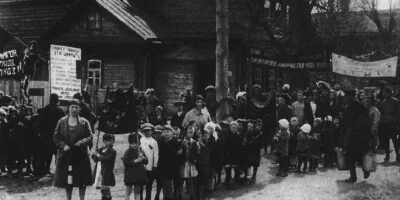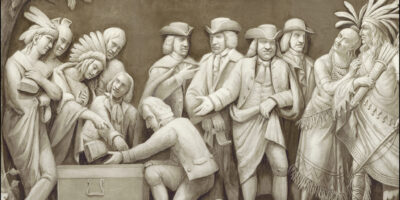The Counterrevolution
Editor’s note: This article was published August 28, 1950. In the aftermath of the Second World War, a generation of intellectuals worked to revive the old liberal cause of free markets, peace, and prosperity. Among them was E.C. Harwood, founder of the American Institute for Economic Research. In this powerful essay, he explains how liberalism (in the classical sense) was a mighty revolution against old world feudalism, protectionism, and top-down control. The counterrevolution is the reimposition of these controls in ways that set back the cause of liberty. He shows that fascism, communism, welfarism, corporativist New Dealism – far from being “progressive” in any sense – all share the same counterrevolutionary longings to set back progress. The piece is particularly interesting because it severely criticizes Truman’s foreign policy, which was supposedly structured to contain Communism but actually (in Harwood’s view) would do nothing to turn back the tide of statism at home or abroad. He offers dark warnings against intervention in Korea. He concludes with a clarion call for a new commitment to the cause of freedom. ~ Edward Peter Stringham
The struggle against communism is not an attempt either to destroy Russia or to preserve the United States; it is not merely another of the numerous rivalries between nations that have crowded the pages of history. The struggle against communism is a crucial one for the survival of Western Civilization. Whether this struggle will mark the decline and fall of Western Civilization or will set the stage for a new, great advance comparable to that of recent centuries remains to be seen.
Because this is not merely a struggle between jealous or greedy monarchs, nor solely a war for empire and trade, nor a religious war between ignorant and intolerant tribesmen, we must seek below the surface and behind events of the day for the fundamental causes of the conflict within Western Civilization. At least briefly we must sketch in the outline of developments on a broad front and in the perspective of recent centuries.
The Situation in Perspective
Several hundred years ago Western Civilization consisted of many vast feudal estates, innumerable· peasant holdings of small farms, uncounted villages and towns, and a few cities, small by today’s standards. For the most part, men lived as their fathers and grandfathers before them had lived: folklore and superstition were generally considered the intellectual keys to understanding, and scientific knowledge as we think of it today was almost unheard of; class distinctions were rigid in many parts of the civilized world; village industry was controlled by the guilds and other authorities; progress was not generally expected and often was not tolerated; most men were slaves, seemingly held in perpetual bondage by custom, fear, ignorance, and superstition.
Only the more fortunate who had been granted dominion over the earth and the fruits thereof, seemingly by an inscrutable Providence, could live much differently than did beasts of burden in that almost forgotten age.
Nevertheless, within that civilization an idea began to find increasing acceptance. In a word, this was the idea that individuals might be free; but its scope developed gradually, and even today we are not sure that we grasp its full implications.
Aided by many circumstances that need not be described in detail, this idea of freedom found more and more disciples. It attributed worth and dignity to the individual man; and, as men gradually and almost reluctantly accepted this new idea, they accepted likewise many increased responsibilities that fostered individual growth in countless ways.
Intellectual freedom opened the doors to the new frontiers of science. As a result, technological progress arose like a giant from sleep to aid the wealth-producing activities of men. Here in America circumstances were most propitious for a civilization based on the idea of freedom. The results we are familiar with; but the magnitude of them is sometimes overlooked, because to us they have become commonplace.
Freedom found acceptance in parts of Europe also. Major social changes marked its advent, and great material progress was one result. However, in much of that area the great revolution never was so successful as it was in the United States. Apparently in only two countries of Europe, Denmark and Switzerland, has the great revolution maintained its gains or progressed in recent decades.
Even here in the United States, however, complete freedom was not reached. Conditions here differed greatly in many respects from those in the Old World; but we now realize that various laws and customs carried over from the Old World had the effect of denying freedom, at least in some degree, to many of the people of our own Nation.
The results of imperfect or partial freedom were not all good. Great material progress came, but the greatly increased production of wealth was not equitably distributed to those who produced it; as a result 12- and 14-hour days for women and children were common in the factories of England, more extensive and more degrading poverty pervaded the slums of Europe, and urban and rural slums developed m the United States.
So striking did the increasing maldistribution of wealth become that many men abandoned the battle for freedom and turned back, thus the counterrevolution within Western Civilization was born. For the past hundred years the counterrevolution has been gaining strength.
Its basic ideas were developed earlier by the utopian Socialists and were organized as counterrevoluionary doctrine by Karl Marx and his followers. These ideas are the roots from which modern communism, socialism, fascism, the New Deal, and the Welfare State all have grown.
In Russia the counterrevolution has reached its apparently inevitable goal; a new despotism has replaced the old. In this fact there is a lesson for all who desire to learn it. Marx and Engels predicted success for communism (the militant branch of socialism) first in the great industrialized nations where they expected the proletariat to unite and cast off its chains. But communism succeeded first, not in the more advanced industrial nations but in Russia, where the progress of the great revolution had been retarded. The reason is not difficult to understand.
The counterrevolution is fundamentally a retreat from individual freedom, from responsibility and authority for each individual, to the sheltering arms of an all-powerful state. Naturally, communism succeeded first where the progress of the great revolution had been least; and it still achieves success most readily in the backward nations of the world, where the substitution of a new despotism for the old is relatively easy.
The Source of Communism’s Strength
However, the fact that communism succeeded first in Russia and that it gains ground most rapidly in the more backward nations of the world should not be permitted to encourage a false sense of security. The basic principles of communism have been widely accepted; and the counterrevolution has gained strength during the past century in nearly all nations of Western Civilization, including our own.
In order to grasp the significance of these gains, we must first understand the source of the strength of communism.
Although the hopes it offers are known by many to be illusory and although its promises are vain, communism derives its strength from those who, because of the inequitable distribution of incomes, have become the underprivileged of all lands. What other hope have those who are denied a substantial part of the fruits of their labor (in order that the perquisites of the privileged may be preserved) than that someone will somehow re distribute currently produced wealth in accordance with men’s needs?
The Marxian slogan, “From each according to his abilities; to each according to his needs,” offers to the poor hope comparable to the hope of a better world offered by many religions. Communism has the added advantage of promising to provide in this world now or in the immediate future what some religions offer only in the next world at some future time.
The strength of communism’s appeal results from its promise to eliminate special privilege for the few and the inevitably corresponding inequality of opportunity and inequality of reward for the many. Communism has grown in strength as special privilege has grown; the farther the nations of Western Civilization have departed from equality of opportunity, one ingredient of freedom, the more they have drifted toward communism.
Fascism often is discussed as though it were the opposite of communism, but such is not precisely the case. Hitler, Mussolini, and Stalin were different in many respects; but the principles of their economic ideologies were the principles of socialism; their initial appeal was to the underprivileged; and the final result, a new despotism, was the same in all three instances.
Summary of the Present Situation
In view of the foregoing, we may summarize the present situation somewhat as follows: Western Civilization as we know it today is the outcome of a great revolution that followed the acceptance of new ideas and that accompanied the progress toward individual freedom including equality of opportunity and economic justice for all men. However, virtually complete freedom has not yet been reached except in relatively small areas of the world and even there only for brief periods.
Primarily because we of this civilization have stopped short of the goal, the results have in part been an inequitable distribution of currently produced wealth. In the minds of many, not even the material progress made possible by the great revolution can offset results that seem so evil. Either not realizing that the goal had never been reached or not understanding that the evils they deplored were attributable to imperfect freedom, many leaders in thought and action sought to turn back; thus the counterrevolution was born.
The counterrevolution is in progress throughout the world. It is recognized as communism; but fascism, various socialist governments, the New Deal, and the Welfare State all have grown from the same roots.
Such is the situation in this midyear of the twentieth century. American foreign policy, if it is to be successful in the long run, must cope with the counterrevolution in Western Civilization.
Lesson of the Immediate Past
Before proceeding to a discussion of American foreign policy, a brief review of recent developments will be helpful. A valuable lesson can be learned from mistakes of the recent past.
Germany and Russia were destined to fight in World War II, not because their ideologies differed, but because there was not room on the same continent for their ambitious rulers. We were allied with Russia not because Russia was one of the democracies fighting for freedom, but because Russia happened to be fighting Germany and could be induced to fight Japan.
However, Americans are sometimes thought by their political leaders to be squeamish and unwilling to face the facts of life. Consequently, Mr. Roosevelt’s administration sought to “sell” the American people the notion that Stalin was a respectable companion in arms. They were not content to use him to the extent that he was useful, while keeping in mind that he was the leader of the counterrevolution threatening Western Civilization· they insisted on adopting Russia into the family of peace-loving nations. In our preoccupation with winning World War II, the Nation’s leaders simply closed their eyes to the important long-term developments that have been described here.
Our foreign policy during and immediately after World War II was a series of blunders precisely because we dealt with successive short-term situations as though there were no long-run fundamental conflict of aims or as though we were blind to other than immediately pressing developments. Such was our major error, and the lesson should not be forgotten.
What Must Our Foreign Policy Provide For?
Prior to World War II, American foreign policy had to cope with two classes of potential enemies. The first included Germany and Japan as potential enemies for the same reason, ambition for power, that nations have so often been enemies since the dawn of recorded history. The other class of potential enemies may be roughly designated communists or, to be more specific, the counterrevolutionary elements within Western Civilization.
Fortunately, the problem of formulating an adequate foreign policy is simplified in some respects by the fact that, in coping with Russia as our only potential enemy of substantial strength in the first class (having a ruler whose ambitions for more territory and power make him a potential enemy), we shall to some extent be coping with the world-wide counterrevolutionary movement.
On the other hand, the situation is complicated by the fact that, in choosing a foreign policy intended to cope with Mr. Stalin’s ambitions for more territory and power, we may erroneously assume that the long-run problem of the counterrevolution is automatically solved merely became we associate the long-run problem, also, with Mr. Stalin.
Actually, Mr. Stalin is not the long run problem; he is merely its temporary figurehead or symbol. Regardless of what happens to Mr. Stalin or to Russia in the next several years, the long-run problem of the counterrevolution will remain.
What Can Be Done About Counterrevolution?
We now come to the question, “How can the foreign policy of one nation deal with counterrevolution within a civilization?” A nation faced with such a counterrevolution has any one of three courses available. Each of these will be discussed in turn.
The first possible course is to join the counterrevolution. To a far greater extent than many people realize, the United States already has chosen this course. Many internal policies, especially (but not by any means solely) some of those adopted in the past two decades, conform to the principles advocated by the counterrevolutionists. In our foreign policies also we have not hesitated to give extensive financial aid to the political parties in control of various governments that are aiding and abetting the counterrevolution. We refer to the socialist governments of England and France.
It should be apparent that the first possible course, which we have already chosen in part, will be self-defeating in the long run. If we encourage the counter- revolution in other nations and yield to its wiles at home, we shall end by joining wholeheartedly, while Western Civilization declines and falls as others have done before.
The second possible course is to attempt to preserve the status quo; that is, neither to press on with the original revolution nor to join the counterrevolution. This apparently is an objective of the Truman policy as described and made effective to date. Although the Truman policy appeared to be somewhat inconsistent for several months, including as it did the extension of military aid to Greece and Turkey and the denial of military aid to Nationalist China and Korea, recent actions and announcements indicate that the policy has become firm. In essence, it appears to contemplate preservation of the status quo as of June 1950 indefinitely. For example, in Korea the official objective, as thus far described, is only to push the North Koreans back to the thirty-eighth parallel.
The second course, preserving the status quo, would seem to us impossible if we may legitimately deduce from history something other than that men never learn anything from history. And, aside from the lessons of history, we know that the conditions in which communism is rooted and from which it derives its strength have become increasingly favorable to communism; and this trend seems destined to continue until progress toward the goals of the great revolution is resumed. Preserving the status quo would become increasingly costly and increasingly difficult as the years pass. Such a policy is only a slower, not a less certain, road to destruction in the long run than the first possible course.
The third possible course is to oppose communism, but what effective means are there for opposing communism? An answer is not difficult to find if one remembers that communism is the ideology of the counterrevolution. Only if Western Civilization presses on toward the goals of the great revolution will the circumstances that have fostered the counterrevolution be changed. Only as the source of its strength is reduced and finally eliminated will the counterrevolution be weakened and finally defeated in the long run.
Practicable Foreign Policy
Only the third course, to oppose communism by pressing on toward the goals of the great revolution within Western Civilization, is a practicable means of coping with the counterrevolution.
Fortunately, no other great nation is so well prepared as our own to undertake this task. In order to reorient our aim, we should study again the Declaration of Independence, the Constitution of the United States. the writings of Jefferson, and other documents such as Lincoln’s emancipation address that have described the goals we once sought so eagerly. Then, after reorienting our aim. we must ascertain why the goals have not been reached, why inequality of opportunity and an inequitable distribution of currently produced wealth became so marked even in the United States as well as in the rest of Western Civilization. Then we shall be in a position to correct the fundamental errors in our procedures that have delayed progress toward the goals of the great revolution.
The United States has become a great nation, a tower of industrial strength in the vanguard of Western Civilization, primarily because the goals of the great revolution were more nearly approached here than they were in Europe. In the greater material progress here in the United States, we have all around us tangible evidence that should more than justify the faith needed to press on. Surely we of all peoples of the world should know that freedom for the individual (not merely freedom from outside domination for a nation), equality of opportunity, and economic justice are the goals to be sought.
Implementation of a Sound Foreign Policy
We have concluded that the only sound foreign policy for the United States in the long run is to resume our former place in the vanguard of the great revolution, to press on toward the goal of complete individual freedom, and to encourage other nations to follow. However, we shall be ill-prepared for such a position of leadership until we have reoriented the policies that we apply at home.
Too long have we yielded to the urgings of those who have joined the counterrevolution. Alger Hiss and others like him may not be traitors in the ordinary sense of that word implying betrayal of their country in order to give advantage to a foreign enemy; perhaps they are merely miseducated men whose good intentions have led them to join the counterrevolution within Western Civilization. We shall underestimate the potential danger if we do not realize that such men are not misanthropic freaks but the products of some of the Nation’s leading educational institutions.
Domestic Policy
Coping with the counterrevolution at home will not be easy. In order to regain the road toward the goals of the great revolution, we shall have to retrace some steps taken in recent years and turn aside from other goals toward which considerable progress has been made.
More specifically, corrective action will be needed along three general lines. First, the distortions of and interference with free-market relationships must be reduced as rapidly as possible and ultimately ended; second, all special privileges must be eliminated; and, third, the activities of the Federal Government must be reduced to the roles of national defense and preventing license or abuse of freedom.
Restoration of free markets is essential if progress is to be made toward the goals of the great revolution. If men are to choose wisely among possible economic alternatives, they must be free to buy and sell at prices agreed among themselves without government intervention, subsidies or controls; they must be free to select, hold, and exchange the money or standard of value that they deem most suitable for the purpose (with men’s customs and views as they are, the gold standard must be restored); and such abuses of the monetary system as inflation must be eliminated.
For 35 years Government intervention and “management” of the Nation’s money credit mechanism have resulted in progressively greater distortions and more extreme interference with free markets. The counterrevolutionists throughout the world have long regarded inflation as their most potent weapon; and events in Russia, Germany, France, and elsewhere have confirmed their judgment.
Holders of special privileges, especially those related to monopolies of natural resources (including land), under existing customs and laws acquire an expanding portion of the wealth currently produced at the expense of the producers thereof. This situation results in increasing the numbers of underprivileged members at the base of society from whom communism derives its strength, and diverts from producers some of the means that could be used to increase production. Because the situation in this respect is more acute in various other countries, for example Italy, many observers see the problem there more clearly. Nevertheless, this problem is becoming acute here in the United States.
Reduction of the role of the Federal Government to the national defense and to functioning as umpire for the purpose of preventing license or abuse of the principles of freedom is essential to the efficiency of Government in performing its primary functions. United States Senators, who should have time for analysis and study of important policy matters such as those described here, spend their valuable time bickering over the price-support levels for Valencia peanuts and innumerable other trivialities that have become the day-today business of an elephantine bureaucracy.
A republic need not be as inefficient as a totalitarian form of government that attempts to control all economic activities; but, if we continue adding to the functions of our Federal Government as we have during recent decades, the fundamental efficiency of free men functioning in free markets will be replaced by the lumbering and creaking performance of a vast bureaucracy. We shall then be as inefficient as our totalitarian enemies.
Foreign Policy Based on the Expedient
If war with Russia is imminent, we should not scorn any allies, even one such as Spain. However, there is no need to repeat the silly process we went through when we used Russia as an ally in World War II, we need not fool ourselves that we are coping with the counterrevolution when we “make a deal” with men like Franco of Spain.
On the other hand, our intervention in Korea has no other excuse but as part of our long-run plan to cope with the counterrevolution. All of our military experts seem to be agreed that Korea would be a liability rather than an asset in the event of war with Russia in the near future. Obviously then, in Korea we should insist on pressing the great revolution, on progress toward the goals of individual freedom, equality of opportunity, and economic justice for all men. Is there any other goal in Korea worth the life of a single American soldier? (Surely our battle cry in Korea is not to be: “Restore to the landlords their vast feudal estates!”)
If in doubt as to how progress toward those goals can be made in Korea once the reconquest is ended, we might well study the situations in Denmark and New Zealand. The lessons we should learn would have the added advantage that they could also be applied here in the United States when we finally realize how badly we need to apply them.
A National Policy Commission?
We realize that the policies we have suggested may not be generally accepted at first. The Nation’s legislators who have been preoccupied with Valencia peanuts can hardly be expected to see world affairs in the perspective here described at first glance, and shallow or confused thinking about the problems of Western Civilization in the twentieth century is by no means confined to the halls of Congress.
Therefore, in closing, we raise the following question. Has not the time come for selection of a National Commission on Foreign and Domestic Policy? Such a commission, composed of the most competent men who can be drawn to its service could be expected to survey the entire problem of American foreign and domestic policy from a nonpolitical viewpoint. By holding extensive public hearings and exploring the various possibilities involved, public attention could be focused on these critical problems of our times and the public could become informed regarding these matters. Finally, before its work ended, such a commission could be expected to report findings and recommendations concerning foreign and domestic policy much as the Constitutional Convention did in 1787 or as the National Monetary Commission did on a less extensive scale four decades ago.
Unless something like this is done, we greatly fear that the statue in New York Harbor of the Goddess of Liberty enlightening the world will no longer be an appropriate symbol of United States policy at home and abroad. And, in that event, what shall it profit us if we gain widespread dominion and for the time being stabilize the world if in so doing we lose our own principles? We shall gain nothing but a little temporary security and shall lose all that we treasure highly as the United States declines and falls with the rest of Western Civilization, a victim of the counterrevolution.











